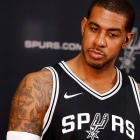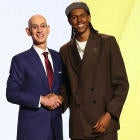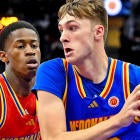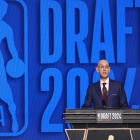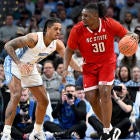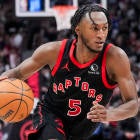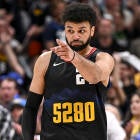When the San Antonio Spurs signed LaMarcus Aldridge to an $84 million contract before the 2015-16 season, it was considered a coup for a small-market team that had turned itself into the paragon of NBA franchises through an unbreakable system, a keen eye for talent, and unparalleled discipline.
The prospect of the Spurs suddenly becoming a free agent magnet must have been daunting for the rest of the NBA -- even the Warriors, who had just won the NBA title and were on the verge of a budding dynasty.
But it was clear almost from the start that there was something just not right about the fit between Aldridge and the Spurs. He was meant to spend a year being groomed by future Hall of Famer Tim Duncan and then take over as the leader of the franchise once Duncan retired.
Instead it was Kawhi Leonard who emerged as the superstar while Aldridge floundered, by his standards, among rumors of unhappiness and potential trades. In Aldridge's last two seasons in Portland, he averaged 23.3 points and 10.7 rebounds per game. In his two seasons so far with the Spurs, those averages have dropped to 17.6 points and 7.9 rebounds.
With the decline in production and all the turmoil surrounding Aldridge, it came as a surprise to some when the Spurs signed him to a three-year, $72.3 million extension which will keep him under contract through the 2020-21 season. It's just the latest in a series of peculiar moves that give the appearance that the Spurs may be lacking direction as the memory of the Duncan-Tony Parker-Manu Ginobili era fades into the distant past.
Let's take a quick look at the Spurs' strange offseason:
June 28: Chris Paul signs with the Rockets
After the Spurs emerged as a possible suitor for Chris Paul, who was expected to opt out of his contract and become a free agent, Paul instead opted into his contract and was immediately traded to the Houston Rockets. On the surface Paul appeared to fit into the Spurs' system perfectly and could have been a running mate for Kawhi as they tried to dethrone the Warriors. This wasn't the Spurs' fault -- Paul decided he wanted to join James Harden instead of testing the free agent waters -- but it was still a huge blow to San Antonio's hopes of acquiring legitimate superstar talent.
July 13: Bye, bye Jonathon Simmons
Rags-to-riches NBA story Jonathon Simmons had been an important role player for the past two seasons, but when Leonard went down in Game 1 of the Western Conference finals, Simmons proved that he could be more than just a 15-minute per game defensive stopper. In his last seven playoff games, Simmons averaged 15.4 points, 2.9 assists and 2.4 rebounds in 28 minutes per game.
The Spurs appeared to enter this summer with every intention of keeping him, as they extended him a qualifying offer of $1.6 million, but worked with him in an effort to come to an agreement on a new contract. The Spurs reportedly failed to offer Simmons the Early Bird exception, which is available to players with two years in the league who have not changed teams.
But the sides couldn't come to terms, and after a failed attempt at a sign-and-trade involving the Suns' Tyson Chandler, the Spurs renounced Simmons, making him an unrestricted free agent. Simmons signed with the Orlando Magic on a three-year, $20 million deal, and now the Spurs are left without one of their best defenders with potential for two-way prowess.
A 28-year-old Simmons isn't exactly an untouchable young talent, but you'd think that the Spurs would be willing to fork over a little more cash to keep him around and take some defensive pressure off of Leonard. Particularly when you consider what they gave to 37-year-old center Pau Gasol.
July 24: Spurs sign Pau Gasol for ... more money?
Veteran center Pau Gasol opted out of the $15.5 million final year of his deal with the Spurs, in theory so that he could restructure to take less annual money to help the Spurs sign free agent talent. Well, that didn't happen, so the Spurs anted up and gave Gasol a robust three-year, $48 million contract. Even with the third year partially guaranteed, San Antonio still owes Gasol $16 million in both his age 38 and age 39 seasons. Not exactly the kind of contract that makes you confident in the future of the franchise.
Now, who knows what happened with the Simmons negotiations. Perhaps he told San Antonio that he wanted to leave so that he could compete for a starting job in Orlando. But you'd have to think that if the Spurs took away some of the money they gave Gasol and used it toward keeping Simmons with the organization that finally gave him a chance, they could have made it happen.
Instead they locked up Gasol, who was effective in limited minutes during the regular season (12.4 points, 7.8 rebounds, 1.1 blocks in 25.4 minutes), but he became unplayable in certain situations in the playoffs against fast-paced Houston and Golden State squads. News flash: Houston and Golden State aren't going anywhere. So signing an aging, plodding center like Gasol to a contract of that size, no matter how skilled he may be, is certainly a head-scratcher.
Oct. 16: Spurs extend LaMarcus Aldridge
Given Aldridge's offensive struggles and a skill set that doesn't exactly fit the modern NBA, it's easy to see why some would be skeptical about signing him long-term. But you have to also look at it this way: What other options do the Spurs have?
The Spurs have undoubtedly been shopping Aldridge for a while now, and they haven't found a deal they like. They struck out with Paul and were never even mentioned as a potential destination for Paul George or Jimmy Butler. While veteran players flock to uptempo offenses like Houston and Golden State, the Spurs have gone backwards, going from sixth in the NBA in pace back in the 2012-13 season to 27th last season. The rigidity of the system probably isn't appealing to young players -- one reason why Aldridge signing there in the first place was a relative surprise -- so instead of a free agent like Gordon Hayward, they end up with Rudy Gay coming off of Achilles surgery hoping to finally sign with a winner.
So the Spurs decided to stick with Aldridge, a known commodity who at $25 million per season starting in 2019-20 is probably appropriately compensated. Overlooked over the last two seasons has been Aldridge's defense, which was considered a weakness when he was in Portland. Being able to protect the rim while providing the offense that he does is not something easily found, and it's something the Spurs will gladly accept for the next four seasons.
Conclusion: When all else fails, bet on the Spurs
Ever heard of Occam's razor? The simplest explanation is usually the correct one. In this instance the simplest explanation, given the Spurs' stellar track record, is that they're somehow outsmarting everyone once again and we're all going to look like idiots very soon.
We can question the moves all we want, but in the end the Spurs are innocent until proven guilty. They've been an A-plus organization for as long as most NBA fans can remember, so they get the benefit of the doubt when they have a summer like this. Maybe Dejounte Murray evolves into the star that will replace Tony Parker. Maybe Brandon Paul gives them exactly what they got from Simmons. Maybe Rudy Gay's offense is exactly what Aldridge needs to help space the floor and let him operate more effectively out of the post.
That being said, the Spurs' ride can't last forever (can it?) and Pop won't coach forever (will he?), so when a summer like this happens it's only natural to think you see the curtain slowly starting to draw on the Spurs' era of dominance. All we know for a fact, however, is that the Spurs -- year in and year out -- have continued to make it work, no matter what pieces they have.









